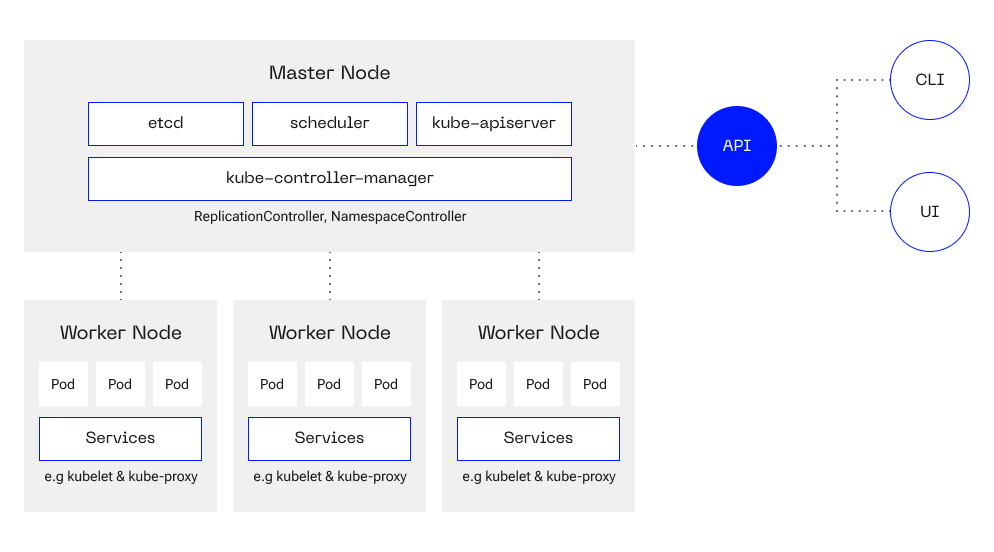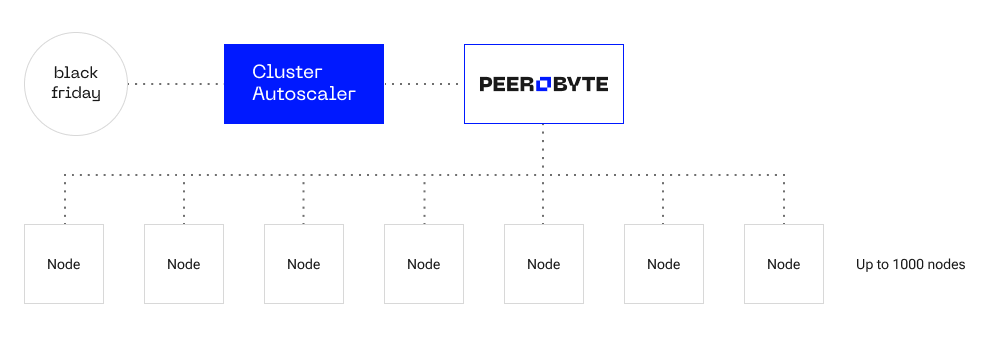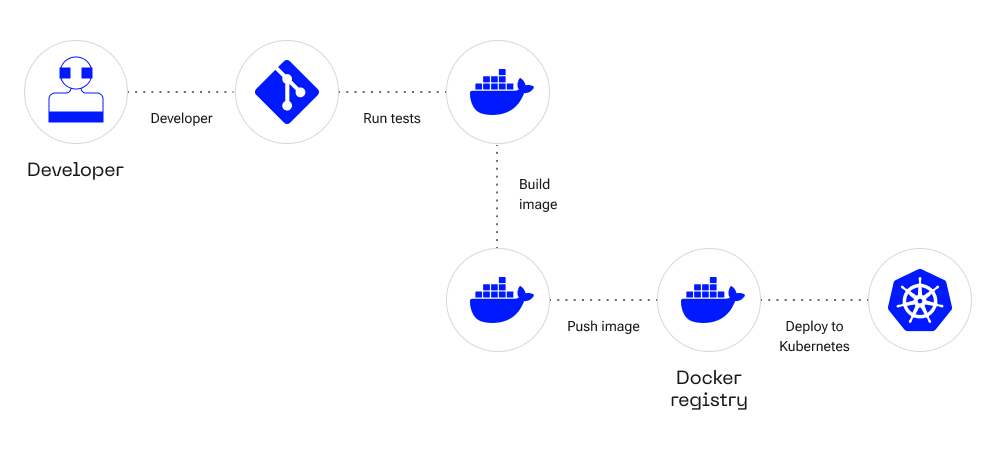-
Products
-
Infrastructure
- Cloud Infrastructure
Everything needed to create and manage cloud infrastructure: virtual machines and clusters, networks, data storage, load balancers.
- Public Cloud
A flexible and scalable cloud infrastructure: virtual servers, data storage, network virtualization, and many more.
- Private Cloud
A cloud cluster with full control: customize resources, manage virtualization, and scale according to tasks.
- Hybrid Cloud
Combining internal physical IT infrastructure with powerful cloud resources.
- Cloud Infrastructure
-
Servers and Computing
- Virtual Machines
High-performance and highly available VPS/VDS with automatic installation and full root access to the OS. The ordered resources are guaranteed to be reserved for you.
- Dedicated Servers
Ready-to-use configurations of physical servers with fast deployment time and component replacement within 24 hours. Internet from 15 TB.
- Cloud Servers
Versatile and scalable virtual server environments designed to grow with your business needs, offering flexible resource allocation.
- Virtual Machines
-
Networking
- Virtual Networks
A suite of networking services offering enhanced security, scalability, and high resource availability to streamline your cloud ecosystem.
- Cloud Firewall
Protecting cloud resources – create access rules and evenly distribute traffic for the stable operation of your applications.
- Load Balancer
Evenly distributing traffic between virtual servers, ensuring high availability and performance of the cloud infrastructure.
- IP Leasing
An expansive IP marketplace that provides a robust foundation for business scalability and continuity.
- Floating IP
Easily reassignable IP addresses that ensure service continuity and high availability for critical applications.
- Virtual Networks
-
Cloud Storage
- Object Storage
Scalable, flexible, and easily managed object storage. Unlimited volume for various types of data and tasks.
- Cloud Data Storage
Network storage supports a wide range of protocols, including FTP/SFTP, NFS, CIFS/Samba, iSCSI, SFTP, SSH (SCP), WebDAV, RSYNC.
- Object Storage
-
Containers
- Kubernetes
An orchestration system for automating the deployment, scaling, and management of containerized applications
- Container Registry
A secure service for storing, managing, and deploying your container images, streamlining your DevOps workflows.
- Kubernetes
-
- MongoDB
A high-performance, NoSQL database perfect for managing large-scale data in a flexible and efficient manner.
- Elasticsearch
A powerful search and analytics engine designed for high-volume data indexing and real-time querying.
- PostgreSQL
An advanced open-source relational database with a strong reputation for reliability, feature robustness, and performance.
- Greenplum
A massively parallel processing (MPP) database platform for large-scale data warehousing and analytics.
- MySQL
The world's most popular open-source database, known for its reliability, simplicity, and speed.
- Redis
An in-memory data structure store used as a database, cache, and message broker for high-speed data handling.
- Apache Kafka
A distributed streaming platform that enables you to build real-time data pipelines and streaming applications.
- ClickHouse
A column-oriented database management system optimized for online analytical processing (OLAP).
- OpenSearch
A community-driven, open-source search and analytics suite used for a broad set of use cases, like real-time application monitoring and log analytics.
- MongoDB
-
Security
- DDoS Protection
Neutralizing DDoS attacks at all OSI levels up to L7 while maintaining the productivity of web resources with Qurator and DDOS Guard.
- DRaaS
Fortify your operational continuity with our resilient disaster recovery solutions, ensuring swift recovery and minimal downtime in the face of unforeseen challenges.
- DDoS Protection
-
-
Community
- Community Digest
Highlights and insights from blogs, news, and Q&As in IT and cloud tech
- News
Latest news from the world of IT and cloud technologies
- Blog
Weekdays of IT specialists, talking about the activities of our company
- Q&A
Use the convenient search for an answer to a question or ask it yourself
- Community Digest
- Documentations
- Referral program
Kubernetes for Business Beta
Reliable and scalable service suitable for any business, from startups to large corporations. Our platform provides convenient and flexible management of Kubernetes clusters, and our team of experts is always ready to help you with any questions. Don't waste time installing and configuring Kubernetes - leave it to us and focus on growing your business.
Kubernetes benefits
Control automation
Deploy Kubernetes in our cloud in minutes. Quickly add new nodes and manage all available features with the Public API

What Tasks we Take on
OS and software installation
Reserve backups
Virtual machines deploying
Upgrade cluster and nodegroups
Storage and hardware security
Network setup
Wizard Availability
Integration with services
Open New Possibilities
| CI/CD | Build a CI/CD pipeline to speed up the release cycle | |
| Service Mesh | Control the flow of data in the application without changing the code | |
| Infrastructure as code | Easily Manage Cloud-Native Applications in Kubernetes | |
| Serverless | Store and process Serverless features in containers | |
| Monitoring and analysis | Monitor application performance with metrics, logging and tracing | |
SOLVE YOUR PROBLEMS WITH PEEROBYTE FOR KUBERNETES
Microservices
Enables flexible deployment and management of containers, providing scalability, resiliency, and automation of microservices operations in a containerized environment.
Autoscaling
Enables rapid application scaling by automatically launching and managing additional container instances based on load, ensuring high responsiveness and budget-friendly resource optimization.
Improvement of development
Facilitates development and testing. It provides tools for creating and managing environments, as well as integration with Continuous Integration and Deployment (CI/CD) tools.
FAQ
Can't find an answer to your question? Ask us and we'll tall you!
What is Managed Kubernetes and why is it needed?
Managed Kubernetes is a service that oversees the maintenance of your Kubernetes cluster, ensuring it remains healthy and efficient. Kubernetes itself is a container orchestration system designed to automate the deployment, scaling, and operation of containerized applications. By using Managed Kubernetes, customers can focus more on developing applications rather than managing the underlying cluster infrastructure.
What are the responsibilities divided between the client and the service provider?
Our responsibilities include:
- Ensuring deployment, availability, scaling, recovery, and updates of the cluster.
- Managing connectivity within the cluster and to the internet.
- Providing user technical support.
- Maintaining control panel availability.
- Integrating with other services we offer.
- Securing data storage and updating cluster software.
Clients are responsible for:
- General management of the Kubernetes cluster.
- Managing worker nodes and applications.
- Initiating scaling and software upgrades.
Do clients need to monitor the health of the cluster?
No, our service automatically monitors and maintains the cluster's health, addressing:
- Core and filesystem issues.
- Communication problems, both internet and intra-cluster.
- Kubernetes component issues. Restoration of cluster functionality is managed by our team.
Which version of the Kubernetes CLI should be used with the cluster?
We recommend using the latest version of Kubernetes CLI (kubectl) to ensure compatibility and access to the latest features.
How frequently are new Kubernetes versions released, and will resources be idle during upgrades?
Kubernetes typically releases new versions every three months, including minor updates in between. During upgrades, control plane nodes may be temporarily idle, and certain operations could be unavailable. However, application loads continue to be processed, and node group updates are handled seamlessly with minimal downtime.
Is it effective to host databases like MySQL or PostgreSQL on a Kubernetes cluster?
While it is technically feasible to host databases using StatefulSet controllers in Kubernetes, we recommend using our managed database services for MySQL or PostgreSQL for better efficiency and ease of use.
How are updates to Kubernetes versions managed?
Customers can select from supported Kubernetes versions and initiate upgrades when convenient. This flexibility allows for thorough testing of application compatibility with new Kubernetes versions before full implementation.
All functionality of peerobyte on BareMetal
Upon request, as with other PaaS solutions, we provide ability to host all the Kubernetes functionality of our public cloud - in a private installation. If you prefer BareMetal for maximum control over your clusters and specific security requirements, we are happy to provide you an advanced service for hosting on dedicated servers.
Other services that may be of interest to your project
S3 object storage
Provide continuous protection and instant access to rapidly growing datasets. This storage is highly scalable, extremely cost effective, and integrates with your application scenarios.
DEDICATED SERVERS
Distribute traffic and workloads in the most efficient way: no server downtime, overload or underutilization.
OUR BLOG
See more posts
What are Public, Private, and Hybrid Clouds: Differences and How to Choose the Right One
If you work in IT, the term “cloud” isn’t just a buzzword — it’s a powerful tool for storing and processing data.

What is PaaS (cloud platform as a service), the benefits and examples of the service
PaaS (Platform as a Service) was initially designed as a solution for developers to build applications without dealing with server setup and infrastructure management.

TCP/IP: The Essential Protocol in Modern Cloud Infrastructure
TCP/IP is the backbone of everything. This protocol stack is like the circulatory system of the Internet and cloud computing.


